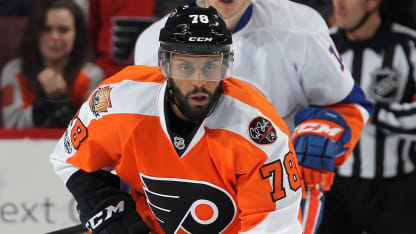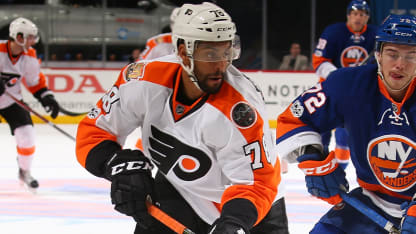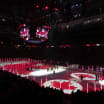There is a reason Philadelphia Flyers forward Pierre-Edouard Bellemare arrives at the rink every day with a smile on his face.
"If the guys knew where I came from, they'd understand," Bellemare said.
Where he came from is southern France. His improbable hockey journey is why he savors every second he spends in the NHL.
Pierre-Edouard Bellemare enjoys improbable journey
After growing up in southern France, Flyers forward savors every moment in NHL

Bellemare and the Flyers will be in the spotlight when they play the Washington Capitals at Wells Fargo Center in the Wednesday Night Rivalry game (8 p.m. ET; NBCSN, TVA Sports, NHL.TV).
It's a long way from the first time he put on skates. When he was 6, Bellemare and his 10-year-old brother, Geoffroy-Alexis, tagged along with their 13-year-old sister, Aurore-Annick, for a hockey lesson. They decided to give it a try.
"It was a figure skating/hockey coach that saw us during a free skating session," Bellemare said. "He told my mom, 'Can you bring them next Tuesday?' He asked my mom how many times we had been on the ice, and that was the first time. We were just going around chasing each other."
The coach suggested that Bellemare's mother, Frederique, sign her sons up for hockey. She did, but because the family had grown to five children, the decision wasn't easy.
"The family wasn't doing that great financially, so there was no chance for us to buy stuff," Bellemare said. "I grew up in a different way than most people in the NHL grew up. … It wasn't easy. But my mom always somehow found a way for me to have skates. I didn't have the [latest] stick, like nowadays kids want the [latest] stick, they want the [latest] skates.
"My pair of skates was 3 years old when I got it. And when I got it, it was too small anyway. But that doesn't matter. The only thing that matters to me was being on the ice. We were not picky. We had no option of being picky that way. It was the same way with seeing hockey on TV. We had no way to be picky. I want to watch the game. No game to watch, it's soccer."
Bellemare said the only chance he got to watch hockey on TV growing up was during the Olympics, which was once every four years. France's lack of hockey awareness led to some odd situations.
"There was no hockey [in France] at that time, you don't know there is the NHL. We're talking about the early '90s. There is no internet," Bellemare said. "The only hockey you see is every four years at the Olympics. People have no idea what hockey is.
"All the way up to when I was 12, 13 years old going around with my stick in Paris, I would get stopped by the cops thinking it was a weapon, but it was a hockey stick for going to practice. … I had no knowledge of what hockey exactly was. I just loved the sport. Didn't know that was something weird."
Bellemare's success meant his family had to move often to find better teams and higher-level competition. Despite the finances, Bellemare said his mother always found a way.
"Lot of credit to my mom," he said. "She was smart enough to see the potential in us. She said, 'This team isn't good enough, we need to move.' She didn't care that we had no money. She would still make the travel, find a way."
He played on age-group national teams that traveled around Europe. However, that's also when he began to learn hockey isn't immune to racism.
"It wasn't difficult until I came to the years where I would go with the national team to other countries and I got to see some stuff that I don't wish anyone would see," Bellemare said. "Or watch a hockey game where they have people who are extremists against colored people. … The first time I heard this I was 14, 15, 16. That's when I heard those things or saw those weird signs from people when I'm on the bus or I'm walking on the street."
Bellemare made France's top professional league as a 17-year-old with Rouen in 2002-03, and in 2006 signed with Leksand, which was playing in Allsvenskan, Sweden's second division.
He was unable to speak Swedish when he first arrived but forced himself to learn the language quickly.
"I was hearing the word French or French guy all the time in Swedish," he said. "I know they're talking about me. I learned the language in secret, and then just listening to those guys. I didn't tell them until six months later that I could talk Swedish, until I had enough and I opened my mouth. Then I got a lot of respect from the entire team."
He also learned about playing defensive hockey for the first time.
"I arrived there, I was not a bad hockey player, but they broke me down [and taught] a new style," he said. "Understand the defensive role, blocking shots, that kind of thing. Stuff I had never done before."
In 2008-09, he led Allsvenskan with 31 goals and then signed with Skelleftea in the Swedish Hockey League. After starting as the 15th forward with Leksand, he again had to work his way up the depth chart.
"Player No. 12 in the lineup," he said. "So it helped me be humble. You're on top, and then all of a sudden what do you do? You just start working again."
The Chicago Blackhawks showed interest, but it cooled because of a hip/pelvis injury that limited him to 29 games in 2012-13. It left him feeling like the NHL never was going to be an option.
"I was 26 years old, a French guy that's not a guy that scores all the goals," he said. "'Who's going to want him in the NHL?' That was my train of thought."
Playing for France at the 2014 IIHF World Championship in Belarus, Bellemare scored the deciding goal in a 3-2 shootout victory in a preliminary-round game against Canada. He had been speaking with the Montreal Canadiens, but when the Flyers showed interest, he was intrigued.
The chance to play for a team in the United States also was appealing; Bellemare's wife, Hannah, is Swedish-American.
He signed a one-year contract on June 11, 2014, earned a spot as a fourth-line center and top penalty-killer, and signed a two-year contract on March 2, 2015.
"He's a worker," Flyers general manager Ron Hextall said. "He's really what you call a self-made hockey player. … He's one of those guys that you pull for because he really made himself an NHL player."
Bellemare has six points in 59 games this season. His average of 2:51 of shorthanded ice time per game leads the Flyers.

"You don't have to be around [Bellemare] very long to know he's a sharp guy who takes a lot of pride in his role," Flyers coach Dave Hakstol said. "He knows what his role is and he goes out … he's a prideful guy that takes a lot of stock in going out and doing his job every night."
That mentality won't change if he gets five minutes or 15 minutes per game. He'll be happy coming to the rink because that's always where he's been happiest.
"I don't mind getting six minutes a night, if it's six minutes on the [penalty kill] and we kill all of them and we win 1-0," he said. "Who cares if it's six minutes? We did our work, the team won and we feel better. … This is all my character and that's helped me have the right picture of my game in this situation."

















